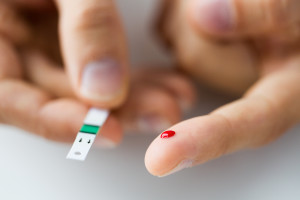 Type 2 diabetes, also called adult onset diabetes, is a chronic condition that affects the way the body processes blood sugar. People with Type 2 diabetes make insulin, but their bodies don’t use it as well as they should. Insulin is a hormone made by the pancreas that allows a body to use glucose from carbohydrates as energy or to store glucose for future use. For those with Type 2 diabetes, the pancreas initially works hard to make more insulin in order to get the glucose into the cells, but eventually it cannot keep up and the glucose goes into the blood instead.
Type 2 diabetes, also called adult onset diabetes, is a chronic condition that affects the way the body processes blood sugar. People with Type 2 diabetes make insulin, but their bodies don’t use it as well as they should. Insulin is a hormone made by the pancreas that allows a body to use glucose from carbohydrates as energy or to store glucose for future use. For those with Type 2 diabetes, the pancreas initially works hard to make more insulin in order to get the glucose into the cells, but eventually it cannot keep up and the glucose goes into the blood instead.
The severity of Type 2 diabetes can vary: Some people need daily insulin injections or tablets and must drastically change their diets. Others may only need to make minor changes such as losing a little weight or exercising.
How many people suffer from type II diabetes
More than 250 million people worldwide are affected by diabetes and more than 3 million new cases are reported in the US each year. The onset of Type 2 diabetes usually occurs in middle-aged and older adults but can also be diagnosed in children and teens.
Symptoms of Type 2 diabetes
With Type 2 diabetes, the body either has a lack of insulin or the inability to use insulin efficiently. When left untreated, blood sugar levels can stay high permanently. These high blood sugar levels can lead to further symptoms including:
• Severe thirst
• Hunger
• Frequent urination
• Feeling tired or lethargic
• Nausea
• Dizziness or blurred vision
• Confusion
• Weight gain or weight loss
• Poor wound healing
• Loss of consciousness (diabetic coma)
Risk factors for Type 2 diabetes
• Being overweight or not exercising
• Smoking
• Heavy drinking
A low-fiber, high-fat and sugary diet
• Some medications can affect the body’s insulin metabolism
• Genetic factors
Effects of Type 2 diabetes
Type 2 diabetes sufferers are more likely to develop other cardiovascular diseases such as heart attacks and strokes. Many also have poor circulation or nerve damage in their legs and feet. If left untreated many other symptoms can occur such at ketoacidosis, damaged blood vessels, dry or cracked skin, pancreas malfunction, gastroparesis, glaucoma and cataracts, visual disturbances, high blood pressure and risk of heart disease.
New treatment method for Type 2 diabetes
Most treatments for diabetes have been concentrated on increasing insulin levels using injections or pills. Insulin helps keep blood sugar regulated so it will not get too high or low.
Proton pump inhibitors (PPIs) could represent a new approach to treating Type 2 diabetes. Gastrin has a large role in the regulation of pancreatic beta cell functions. Beta cells store and release insulin which reduces blood glucose concentration. When these PPIs are taken, the effect is an increase in serum gastrin, and essentially insulin. In studies, PPIs have shown to be a safe treatment, with minimal or no side effects. Proton pump inhibitors need to be further studied but could be the future of managing diabetes.
What to do if you have diabetes
If you or a loved one suffers from diabetes please contact a Houston diabetes specialist at OakBend Medical Center. To set up a consultation with a registered dietitian or endocrinologist or for more information please call 281-341-3000 today. If left untreated symptoms will only get worse and can even be fatal. Don’t wait until it’s too late for help.
